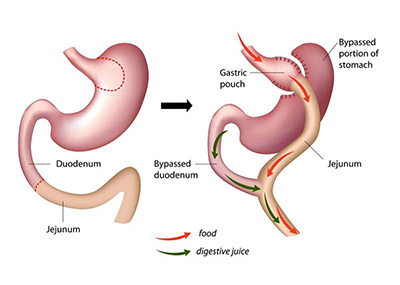
1. Study Finds Roux-en-Y Gastric Bypass |

![]() According to findings published in Diabetic Medicine, Danish adults with type 2 diabetes and obesity who underwent Roux-en-Y gastric bypass (RYGB) were less likely to develop diabetic retinopathy compared with similar adults who did not undergo bariatric surgery, with no signs of “early worsening” retinopathy that can follow rapid diabetes improvement.
According to findings published in Diabetic Medicine, Danish adults with type 2 diabetes and obesity who underwent Roux-en-Y gastric bypass (RYGB) were less likely to develop diabetic retinopathy compared with similar adults who did not undergo bariatric surgery, with no signs of “early worsening” retinopathy that can follow rapid diabetes improvement.
![]() “In large-scale studies of mixed bariatric procedures, surgically induced remission of diabetes has shown beneficial effects on microvascular complications,” Lene Margrethe Ring Madsen, MD, of the department of endocrinology and internal medicine at Aarhus University in Denmark, and colleagues wrote. “However, because the improvement in blood glucose regulation has an immediate onset, the concern of ‘early worsening’ in retinopathy also applies to [RYGB].”
“In large-scale studies of mixed bariatric procedures, surgically induced remission of diabetes has shown beneficial effects on microvascular complications,” Lene Margrethe Ring Madsen, MD, of the department of endocrinology and internal medicine at Aarhus University in Denmark, and colleagues wrote. “However, because the improvement in blood glucose regulation has an immediate onset, the concern of ‘early worsening’ in retinopathy also applies to [RYGB].”
![]() Madsen and colleagues performed a cross-sectional study with 96 adults with obesity and type 2 diabetes who underwent RYGB (mean age, 55.6 years; 78% women) between 2006 and 2011 in Denmark.
After adjustments for diabetes duration, age, sex and current BMI, participants in the RYGB group were at lower risk for developing retinopathy (RR = 0.82; 95% CI, 0.59-1.14) compared with the control group.
Madsen and colleagues performed a cross-sectional study with 96 adults with obesity and type 2 diabetes who underwent RYGB (mean age, 55.6 years; 78% women) between 2006 and 2011 in Denmark.
After adjustments for diabetes duration, age, sex and current BMI, participants in the RYGB group were at lower risk for developing retinopathy (RR = 0.82; 95% CI, 0.59-1.14) compared with the control group.
![]() In the RYGB group, 52% of participants experienced diabetes remission, defined as an HbA1c of 6.5% or less with no anti-diabetes medication or an HbA1c of 6% or less with metformin monotherapy.
In the RYGB group, 52% of participants experienced diabetes remission, defined as an HbA1c of 6.5% or less with no anti-diabetes medication or an HbA1c of 6% or less with metformin monotherapy.
![]() The researchers further examined a subsample of 65 participants for whom fundus photography was available. Participants from the RYGB group did not show a change in retinopathy grading, but those in the control group had deteriorated grading (P < .001). The researchers noted that in the RYGB group, the risk for worsened retinopathy when compared with the control group was 0.26 (95% CI, 0.1-0.64). In addition, the risk for worsened retinopathy was slightly higher in those of the RYGB group who did not reach remission (RR = 0.27; 95% CI, 0.1-0.69) compared with those who did (RR = 0.13; 95% CI, 0.02-1.02).
The researchers further examined a subsample of 65 participants for whom fundus photography was available. Participants from the RYGB group did not show a change in retinopathy grading, but those in the control group had deteriorated grading (P < .001). The researchers noted that in the RYGB group, the risk for worsened retinopathy when compared with the control group was 0.26 (95% CI, 0.1-0.64). In addition, the risk for worsened retinopathy was slightly higher in those of the RYGB group who did not reach remission (RR = 0.27; 95% CI, 0.1-0.69) compared with those who did (RR = 0.13; 95% CI, 0.02-1.02).
For enquiries info@jothydev.net.
Please visit: jothydev.net | research.jothydev.com | diabscreenkerala.net | jothydev.com/newsletter
